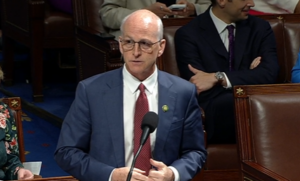
The House on Thursday continued considering the fiscal year 2025 National Defense Authorization Act, debating a series of amendments aimed at prohibiting further Ukraine aid and a slew of GOP-proposed policy measures that Democrats have called “poison pills.” Ahead of a likely vote on final passage of the defense policy bill on Friday, the House is continuing through a series of votes that has included a bipartisan effort to block a measure from Rep. Marjorie Taylor Greene (R-Ga.) that would…

 By
By 










